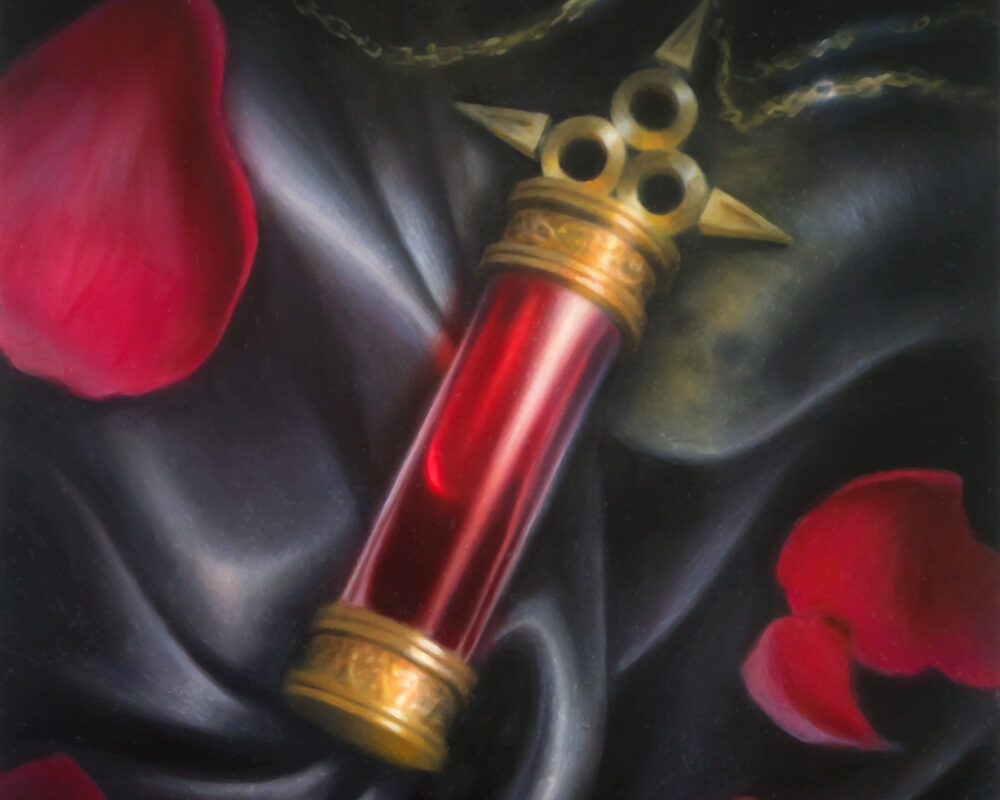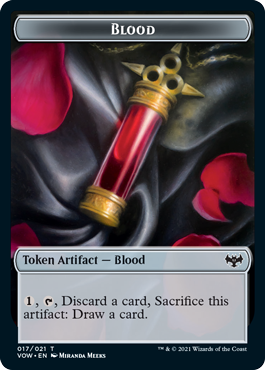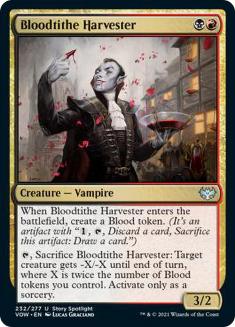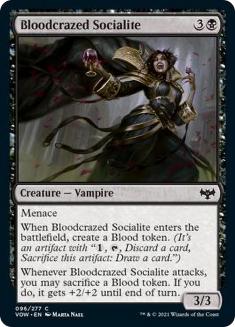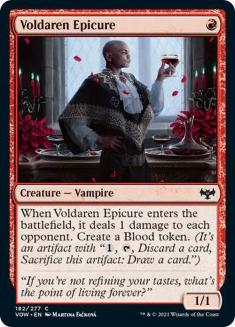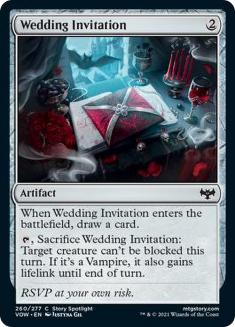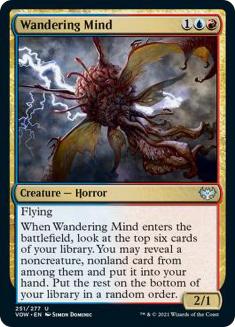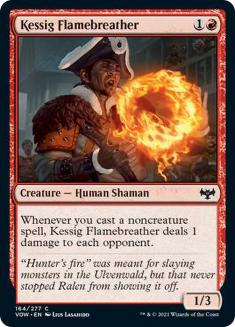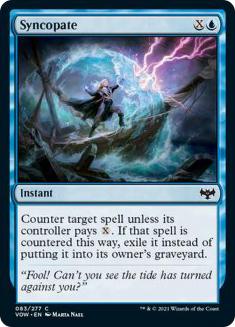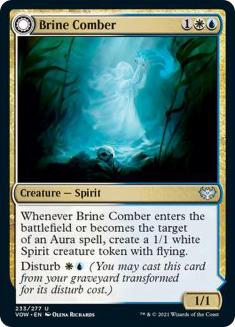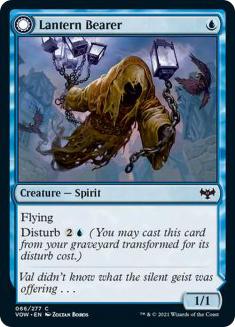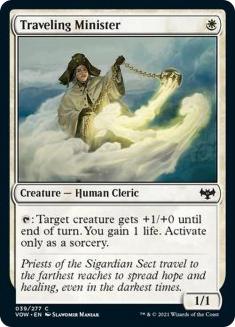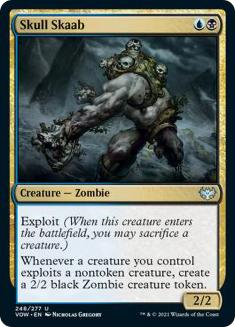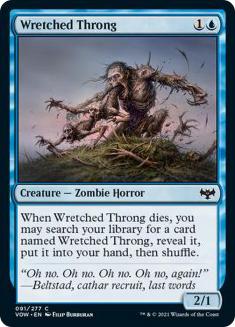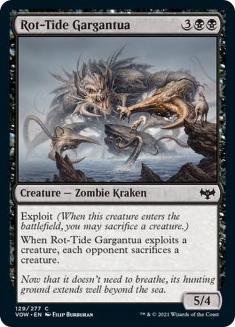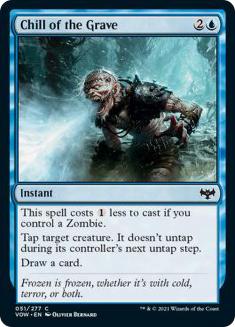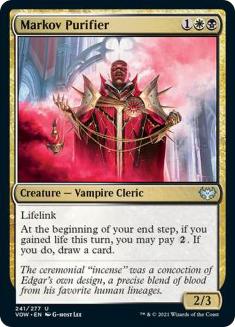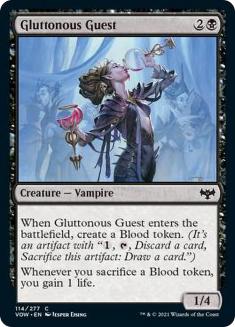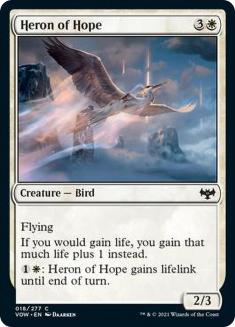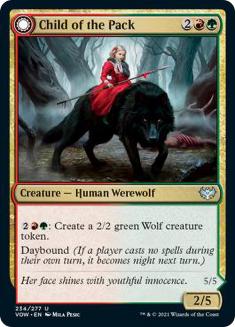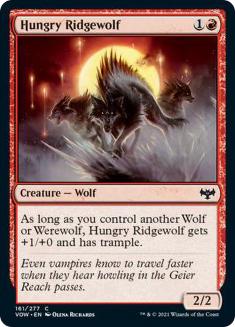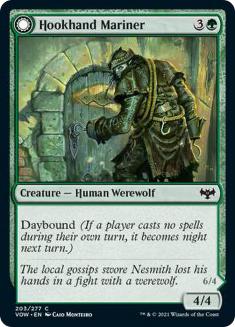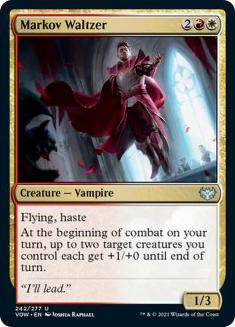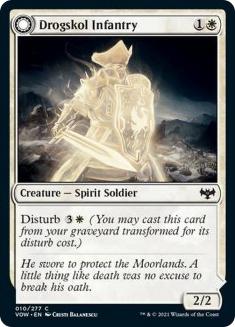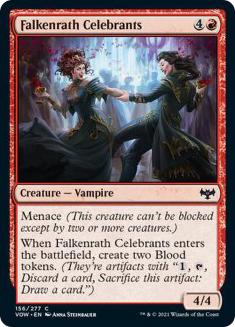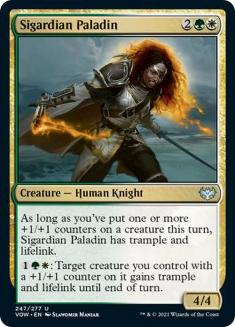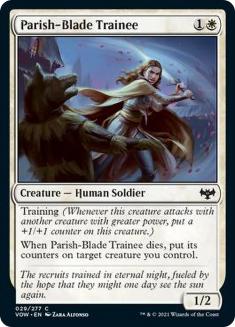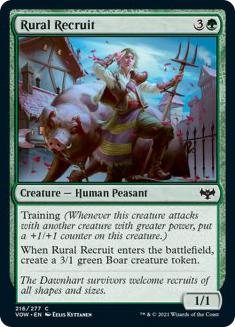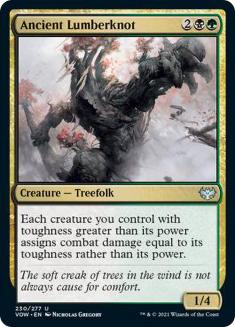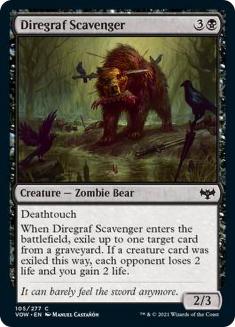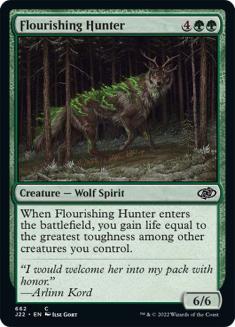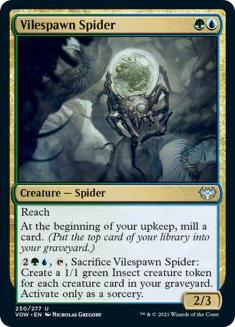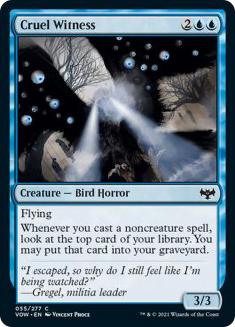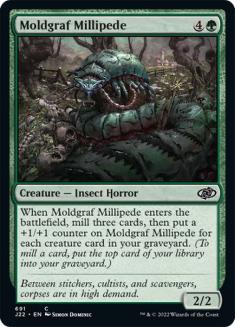Innistrad: Crimson Vow is home to one of my personal favorite Limited mechanics, Blood. It gives players a lot of great decision-making opportunities, as well helping curb mana issues.
For those interested in revisiting this plane while it’s a Premier Draft format on MTG Arena, I’ll give my thoughts on the archetypes of the format, as well as examples of successful decks I’ve had in those archetypes. I’ve also included a “Cards to avoid” section, outlining cards that look like they could work in the deck, but don’t.
Tier 1
Rakdos
I’ve got Rakdos as the most consistently powerful archetype of the format. Rakdos has access to a huge roster of playable cards, a diverse suite of removal, and the powerful Blood mechanic. With all of that in mind, it’s a highly contested color pair. Rakdos is strong as both aggro and midrange, with the ability to win late-game via Blood’s card selection.
Vampires’ Vengeance is a bomb in this deck, and should be picked highly. Markov Retribution is in a similar vein (intentional), becoming incredibly powerful if your deck is mostly Vampires. Bloodcrazed Socialite is the premier black common creature, often attacking as a 5/5 with menace every turn until something dies. Voldaren Epicure and Falkenrath Celebrants are the best red common creatures, and Alluring Suitor is the best non-rare creature for the deck. Wedding Invitation is obviously good here, so invite some guests!
Avoid: Blood Hypnotist, Sanguine Statuette, Reckless Impulse, Bloody Betrayal, cards with exploit
Creatures (15)
- 2 Alluring Suitor
- 2 Bloodcrazed Socialite
- 2 Kessig Flamebreather
- 1 Voldaren Epicure
- 3 Falkenrath Celebrants
- 2 Ragged Recluse
- 2 Desperate Farmer
- 1 Diregraf Scavenger
Lands (17)
Spells (8)

Izzet
A streamlined Izzet build can be one of the most powerful archetypes of the format, but it does have the drawback of sometimes being inconsistent. The overall gameplan in most decks is to win via quasi-direct damage dealt by evasive threats and Kessig Flamebreather. Ancestral Anger is at its best here, especially when you have the right threats on the battlefield.
Izzet is by far the best counterspell deck in the format, using Syncopate, Syphon Essence, and Geistlight Snare, in order from best to worst. The deck wants to play at instant speed, threatening burn, counters, or draw spells. If you don’t end up with any Kessig Flamebreathers, Selhoff Entomber or Steelclad Spirit can be early walls to allow you to pass the turn with mana open. Scattered Thoughts and Thirst for Discovery are also at their best in this deck. Bloody Betrayal and Serpentine Ambush are two surprisingly playable cards in this archetype if the deck needs them.
Avoid: Wanderlight Spirit, Wash Away, Dreadlight Monstrosity
Creatures (12)
- 1 Lantern Bearer
- 4 Kessig Flamebreather
- 1 Stormchaser Drake
- 1 Lambholt Raconteur
- 1 Dreamshackle Geist
- 2 Falkenrath Celebrants
- 1 Binding Geist
- 1 Cruel Witness
Lands (17)
Spells (11)

Azorius
Azorius is my personal favorite of the top-tier archetypes in Innistrad: Crimson Vow. The disturb mechanic goes unchecked in Best-of-One, with the only realistic threat to your graveyard being Diregraf Scavenger. Azorius is a flyers deck as usual, which makes the already powerful Traveling Minister even more potent. Nurturing Presence is a surprisingly strong card here, providing flying bodies that you can later enchant with your disturb creatures that hit the graveyard.
I like to prioritize Drogskol Infantry if I know I’m in the archetype. It staves off early threats and disturbs a flyer later in the game. Geistlight Snare is incredibly powerful in this deck, often being a Mana Leak that costs a single blue mana. Scattered Thoughts also gets bonus value here, sometimes putting disturb creatures in your graveyard and drawing cards at the same time.
Avoid: Distracting Geist, Supernatural Rescue, Gutter Skulker, Soulcipher Board
Creatures (13)
- 1 Drogskol Infantry
- 2 Kindly Ancestor
- 1 Angelic Quartermaster
- 1 Brine Comber
- 1 Twinblade Geist
- 2 Lantern Bearer
- 1 Heron of Hope
- 1 Fleeting Spirit
- 1 Traveling Minister
- 1 Binding Geist
- 1 Steelclad Spirit
Lands (17)
Spells (10)

Tier 2
Dimir
Dimir is a midrange deck that gains its advantage via the exploit mechanic. You need to have a healthy balance of exploit creatures and fodder that you don’t mind exploiting. Biolume Egg is the best card in the deck, and is why I end up Dimir most of the time, as I rarely pass the card. Other reasonable fodder includes Doomed Dissenter, Lantern Bearer, Wretched Throng, and Persistent Specimen, listed in order from best to worst.
As for exploiters, most of the weight is on the uncommons, Diver Skaab, Fell Stinger, and Skull Skaab. At common, Rot-Tide Gargantua and Repository Skaab are the top two, with Stitched Assistant and Mindleech Ghoul not always making the cut. Undying Malice can be a fun card to include, as getting two exploits off an exploit creature like Rot-Tide Gargantua (both targeting and sacrificing itself) can be a powerful sequence. Archghoul of Thraben can really pop off in this deck if you happen to get the oops-all-Zombies version of the deck.
Avoid: Cobbled Lancer
Creatures (13)
- 1 Gluttonous Guest
- 1 Archghoul of Thraben
- 1 Biolume Egg
- 2 Mindleech Ghoul
- 2 Lantern Bearer
- 1 Bloodvial Purveyor
- 1 Stormchaser Drake
- 2 Repository Skaab
- 1 Stitched Assistant
- 1 Persistent Specimen
Lands (17)
Spells (10)

Orzhov
Orzhov has some of the most powerful synergies in this format if you get the right cards for it. This is the best deck for Ragged Recluse, as well as the duo of Gluttonous Guest and Restless Bloodseeker. White adds Traveling Minister, Heron of Hope, and Kindly Ancestor to the roster of synergy creatures. Multiple Courier Bats can be a win condition on their own, provided you have reliable lifegain. This is also the best deck for Pointed Discussion, giving you the card advantage you crave while offsetting the drawback with lifegain.
This also the only deck I’d feel happy about playing Wedding Security in, assuming you brought enough Blood for the class. Catapult Fodder can also be a win condition for the deck, with Heron of Hope and Kindly Ancestor meeting the requirements.
Avoid: Bride’s Gown / Groom’s Finery, Dawnhart Geist
Creatures (17)
- 2 Gluttonous Guest
- 1 Voldaren Bloodcaster
- 1 Drogskol Infantry
- 1 Kindly Ancestor
- 1 Markov Purifier
- 2 Heron of Hope
- 1 Bloodcrazed Socialite
- 2 Courier Bat
- 1 Catapult Fodder
- 1 Nebelgast Beguiler
- 1 Ragged Recluse
- 1 Desperate Farmer
- 2 Diregraf Scavenger
Lands (17)
Spells (6)

Tier 3
Gruul
Gruul looks to put out bigger creatures than your opponent, aiming to end the game before more value-oriented decks stabilize. Two-drops are extremely important to getting early pressure established. Hungry Ridgewolf is the best common two-drop in the archetype, but there are many other suitable options. Tricks are an important component in Gruul, with Might of the Masses as the premium option due to the cheap mana cost and trample.
Hookhand Mariner, Flourishing Fox, and Falkenrath Celebrants are some of the common big creatures you will look to use mid-game and later. There’s a hidden aggro strategy with Snarling Wolf and Bramble Armor, but while it can come together, I wouldn’t recommend chasing that dragon.
Avoid: Oakshade Stalker (as a high pick), Weary Prisoner, Lambholt Raconteur, Lightning Wolf
Creatures (18)
- 2 Snarling Wolf
- 2 Fearful Villager
- 1 Kessig Wolfrider
- 1 Weaver of Blossoms
- 1 Alluring Suitor
- 1 Reclusive Taxidermist
- 1 Hungry Ridgewolf
- 1 Flourishing Hunter
- 1 Infestation Expert
- 1 Voltaic Visionary
- 2 Child of the Pack
- 1 Falkenrath Celebrants
- 1 Blood Petal Celebrant
- 2 Hookhand Mariner
Lands (17)
Spells (5)

Boros
Boros is largely written off (as is tradition), but it has a lot of favorable matchups in this format. It’s the fastest deck, which can easily get under the slower archetypes thanks to Markov Waltzer. You want to keep your creature count high, and the mana cost low. If you have Blood generation, I’d recommend not trimming any lands, as you can cycle them away later.
This is the only archetype I like Ceremonial Knife in, and if my deck isn’t incredibly powerful, I will almost always play it. Wedding Invitation is also great here, even though white doesn’t add any Vampires – the unblockable effect is the more important text in this case. Adamant Will and Sure Strike are both potent tricks for the deck, allowing you to attack every turn. Nurturing Presence is also a great card for Boros, and is often overlooked for the archetype.
Avoid: Daybreak Combatants, Frenzied Devils, Radiant Grace, Arm the Cathars
Creatures (15)
- 1 Drogskol Infantry
- 1 Kindly Ancestor
- 1 Angelic Quartermaster
- 1 Alluring Suitor
- 2 Belligerent Guest
- 1 Heron of Hope
- 1 Kessig Flamebreather
- 2 Markov Waltzer
- 1 Parish-Blade Trainee
- 3 Traveling Minister
- 1 Falkenrath Celebrants
Lands (17)
Spells (8)

Tier 4
Selesnya
Selesnya is among the weakest archetypes. The training mechanic is fragile and slow, and the payoffs aren’t all that great. Cloaked Cadet rarely makes an impact due to the lack of good training creatures, but can be amazing if your deck has Dormant Grove(s). If you do end up wanting to train your Humans, Adamant Will and Estwald Shieldbasher can be good role-players. Dawnhart Disciple can be incredibly strong in the deck if you have plenty of Humans and a lower curve. This is also the deck with the most Humans for Resistance Squad.
Avoid: Ollenbock Escort, Laid to Rest, Gryffwing Cavalry
Creatures (17)
- 1 Drogskol Infantry
- 2 Kindly Ancestor
- 1 Howlpack Piper
- 1 Bramble Wurm
- 1 Markov Purifier
- 1 Old Rutstein
- 1 Dawnhart Disciple
- 1 Flourishing Hunter
- 1 Heron-Blessed Geist
- 2 Parish-Blade Trainee
- 3 Traveling Minister
- 1 Spore Crawler
- 1 Hookhand Mariner
Lands (17)
Spells (6)

Golgari
Golgari is a slow, defensive deck, bumping Sir Mix-a-Lot (and it cannot lie). The two cards that take into account the size of one’s posterior are Ancient Lumberknot and Catapult Fodder. If you have at least two or more, your gameplan will change to leverage those as the win conditions. If not, you will have to finish your opponents the old-fashioned way, which will mostly rely on the large creatures to finish games. Flourishing Hunter, Hookhand Mariner, and Bramble Wurm are among the best green options, with black providing removal, Rot-Tide Gargantua, and Bloodcrazed Socialite. If you don’t get the toughness-matters cards, it’s going to be a long day.
Avoid: Unhallowed Phalanx, unless you have at least four payoffs (Catapult Fodder or Ancient Lumberknot)
Creatures (15)
- 1 Doomed Dissenter
- 1 Fell Stinger
- 2 Mindleech Ghoul
- 1 Innocent Traveler
- 1 Weaver of Blossoms
- 1 Bramble Wurm
- 1 Flourishing Hunter
- 1 Sporeback Wolf
- 1 Spore Crawler
- 1 Hookhand Mariner
- 1 Desperate Farmer
- 1 Oakshade Stalker
- 2 Diregraf Scavenger
Lands (17)
Spells (8)

Simic
Simic doesn’t have a super-cohesive gameplan, with the self-mill payoffs being pretty weak (aside from Vilespawn Spider). If you do happen to end up here, it’s likely due to high card quality, with very low synergy. This is actually the only archetype that I haven’t earned a trophy with, which should be an indication that it’s not an archetype worth pursuing.
Avoid: Crawling Infestation, Soulcipher Board, counterspells
I’d give Innistrad: Crimson Vow Limited about a 5/10 on my arbitrary Draft scale (patent pending). The color balance is pretty rough, with some archetypes unable to compete with a Tier 1 deck of 23 commons. Blood is a 9/10 mechanic in Limited, and I hope we can see a similar evergreen mechanic in future Limited sets. If you want to get your blood pumping, I’d recommend getting a few drafts in while you can!
Lose and Learn, Learn and Win!

